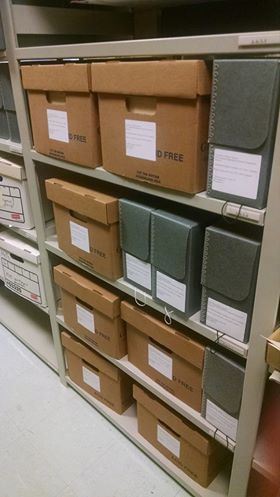This week, we’ve invited one of our frequent readers to join us for a dialogue about the relationship between historians and archivists. Sharon Wolff earned both her graduate and undergraduate degrees in Information Science at the State University of New York at Albany while working as a student assistant in the special collections/archives department. She currently works as the Assistant Archivist at Northwestern State University in Louisiana.
Kevin: Sharon, before we start, I wondered if you might talk about your background and what drew you to a career as an archivist?
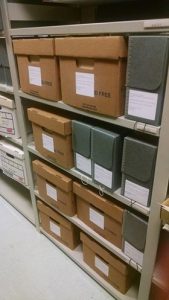
Sharon: Well, I have loved books from a very young age, and I actually entered college with the intention of becoming a librarian. But as my classes progressed and I started looking into graduate programs/classes, I realized that the archive track appealed to me a lot more than the library track did. I did some research and interned over the summer at the special collections department where I processed my first collection and the rest was history.
I guess what it comes down to is archival work is a lot more hands-on than library work and you get much more into the nitty-gritty of history. In libraries you handle books but in archives you’re mostly working with primary source documents. So when I process a collection, organizing it in a way that makes it easier for researchers to access, I am literally handling the same paper/film/photos/etc. that the person who created them did. Which is truly amazing. Out of curiosity, what have your experiences with archives been?
Kevin: I was spoiled at Gettysburg College to have access to the wonderful resources and staff of Special Collections at Musselman Library. I did a lot of work there for classes, starting with Michael Birkner’s Historical Methods, as well as independent and co-curricular projects. I also visited the Pennsylvania State Archives and Hershey Community Archives for the latter. After graduating, I had the privilege of spending some time at the Imperial War Museum, the Surrey Historical Centre, and the UK National Archives as part of the Jack Peirs project. I have several American university archives on my list for spring 2018, as well as two social history archives in Europe.
Sharon: Quite the extensive list! What kind of research were you doing?
Kevin: In general, my work has involved searching narrowly for specific individuals in a limited number of collections or getting a macro view of specific groups of documents. Because of the nature of undergraduate assignments, these sources enhanced my papers and satisfied paper requirements, but have not generally featured at the core of my research process. My thesis, on the other hand, will be fully depend on what I find next semester in a wide array of collections–and it may be a stressful spring if I strike out. I have several full collections to go through at multiple sites, and I’m currently starting to organize lists of what I need to view in each facility.
Sharon: What were your impressions of archives before/after you used them for the first time?
Kevin: I was excited to go to the archives, but as a child of the digital age I was also surprised that more hadn’t simply been digitized. Now I understand the limitations, but when first-year college student Kevin saw how many years of newspapers were online, his first reaction was that anything could be made available digitally. I was terrified of making a handling mistake–in fact I had to be corrected several times early on for various minor infractions. However, the more I use archives and the more I learn about how archivists organize them, the more they make sense to me and the more I get out of them.
Sharon: I completely sympathize. The thing people don’t realize is that digitizing documents takes time, effort, money, more training than you’d think, and sometimes specialized equipment which requires more money and training. There is also the question of how to host the digitized documents online which often leads to even more money as a subscription fee is very often required from institutions wishing to use a database. But you’re learning! Experience, as always, is the best teacher. So, how do you think historians in general view archives/archival research?
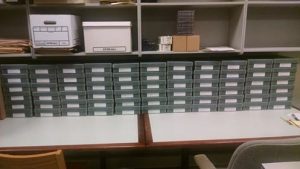
Kevin: My professors–both at Gettysburg and Columbia–have overwhelmingly stressed the importance of archives in original research, to the point that when someone says archival work is necessary for a project of a certain scale, I’m generally surprised at the need to emphasize it. Archives are the lifeblood of the discipline.
Sharon: I’m very glad to hear it. Now, you mentioned struggling at first with visiting repositories for research, is there something you think could be done to facilitate archival research?
Kevin: Some archives have what I think of as TSA-type policies that are intended to protect documents but sometimes do so less than effectively while making it harder to conduct research. I’ve also developed a sense of the importance of cooperation between historians and archivists, and I like it when archivists have some information about themselves online. It gives me a better idea of who I’m contacting when I reach out asking for additional information and enables me to better frame my request to be in line with the capabilities of the archive in question.
Sharon: Yes, unfortunately ‘security’ measures, which vary widely from place to place, are incredibly frustrating. Many of them are common sense; for example don’t have your morning coffee and donut while thumbing through a collection, and for goodness sake only ever take notes in pencil. But some of them appear to border on the paranoid to the unassuming researcher. Not being allowed your coat, bag, or spiral notebook is very inconvenient; but the trouble is that all of those things represent a breach in security that has resulted in the theft or destruction of documents in the past. Once bitten, twice shy, to the misfortune of innocent bystanders.
Kevin: I can certainly understand that sentiment.
Sharon: Given that these rules combined with the uniqueness of archival research can be overwhelming, what advice would you give to someone who was thinking of undertaking research in an archive for the first time?
Kevin: Do your due diligence online to find out as much as you can about what you’re looking for, but reach out to an archivist to determine the full scope of the relevant resources. They often know far more about where to look than an online database or even finding aids will reveal. Conversely, what do you wish aspiring historians would know before coming to you?
Sharon: Actually pretty much what you have outlined there! The number one thing is, come prepared. Have a solid idea in mind for what you want to research, and make contact with the archive in advance so they know you’re coming. If possible, tell them what collection you want to look at and which parts. The thing is, unlike libraries, archive patrons aren’t allowed access to the storage stacks. This is for security reasons as well as efficiency; archival collections just aren’t browsable the way books are. So if a researcher wants to look at a set of documents, the archivist has to go back and pull the files for them. A lot of time is saved if the archivist knows beforehand what the person is trying to research so the boxes/files can be ready and waiting when they arrive.
Kevin: How would you describe your archival philosophy? How do historians fit into it?
Sharon: My philosophy is that archives are a tool to help people gain access to information. The collections and documents exist as a way to provide insight into a moment in time; and it’s my job to facilitate the access to that insight and information as much as possible. Historians, to me, are pretty much just like any other researcher except they have a better understanding of the pitfalls of primary source documents. Usually. The good ones, at least. Historians know that while a memo as a piece of paper does not contain bias, the person who wrote it does.
Kevin: As an archivist, what is your reaction to news like the recent announcement that the UK National Archives allegedly ‘lost’ thousands of sensitive documents regarding the Troubles in Northern Ireland and other 20th century conflicts?
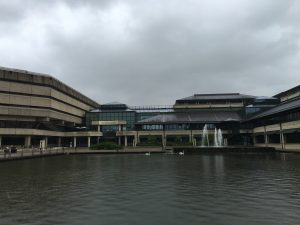
Sharon: My knee-jerk reaction to something like this is outrage. Like libraries and museums, the collections that are kept in archives are held in the public trust. With the exception of information that is deemed a violation of privacy, like medical records, or if something is to be restricted at the collection donor’s request, every scrap of information stored in an archive should be made available for public viewing/use. For a government entity to remove materials from an archive, after they have been declassified officially, in an effort to prevent public access to them is not only disgraceful, it is a betrayal of trust on the most fundamental level. If certain documents represent a security risk, the way to handle it is not to remove the files from the archive and then claim to have lost them. Such an action is extremely suspicious and also completely childish.
Kevin: Beyond that, I see it as a human rights offense against victims and victims’ families who have an internationally recognized right to truth. I also recall that the UK has a history of ‘losing’ documents. Even though their age of empire has passed, the government remains committed to upholding the fundamental validity of the project, even if it means destroying records in order to do so. All just to avoid admitting past wrongdoing. It hurts the public, prevents historians from doing their job, and is an insult to the archivists who work so diligently to preserve the past.
Sharon: Agreed. What was your favorite collection to go through or your favorite research discovery?
Kevin: I don’t know that I can call it a favorite experience, but my first archival assignment for Historical Methods was to read through a random, unprocessed box and write a 10-page paper about what they revealed about the amateur historian who produced them. Some people got letters from politicians and other public figures; I was assigned a box of thank you notes. But I made it work somehow and even discovered that one of the historian’s friends once dated the grandmother of one of my friends from home. So that was certainly a surprise.
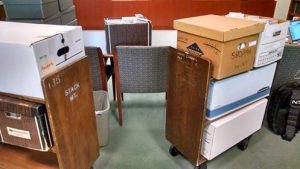
Sharon: Ah wonderful! The very first collection I ever processed was a university professor who supervised student experiments over the summer semester at a college-sponsored camp, and one of the students turned out to be my next-door neighbor growing up. Archives can give us such serendipitous discoveries.
Kevin: That’s really neat. Sharon, thanks for talking with me today. Any closing thoughts you’d like to offer our readers?
Sharon: Don’t let inexperience fuel any trepidation you may have about visiting archives. When in doubt, contact the archive! All the archivists I know are happy to answer any queries we get about our holdings, and there is no such thing as a stupid question.
